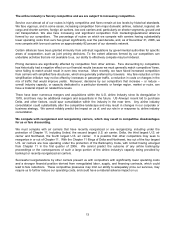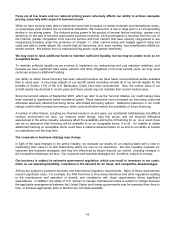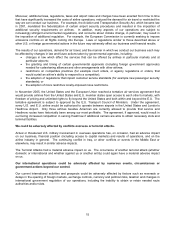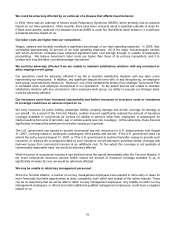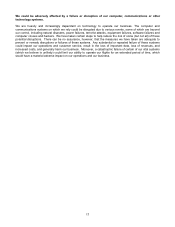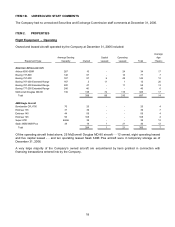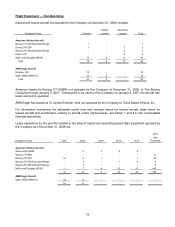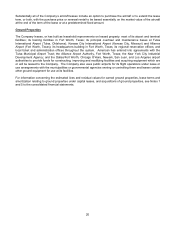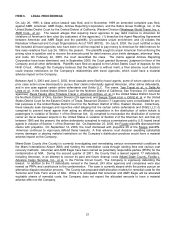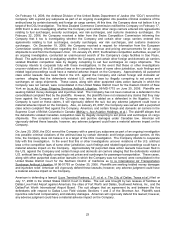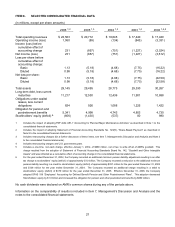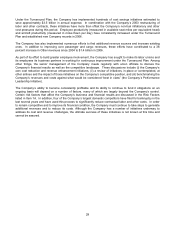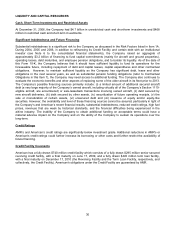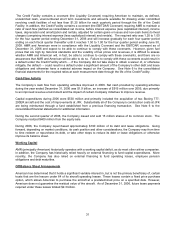American Airlines 2006 Annual Report Download - page 25
Download and view the complete annual report
Please find page 25 of the 2006 American Airlines annual report below. You can navigate through the pages in the report by either clicking on the pages listed below, or by using the keyword search tool below to find specific information within the annual report.
21
ITEM 3. LEGAL PROCEEDINGS
On July 26, 1999, a class action lawsuit was filed, and in November 1999 an amended complaint was filed,
against AMR, American, AMR Eagle, Airlines Reporting Corporation, and the Sabre Group Holdings, Inc. in the
United States District Court for the Central District of California, Western Division (Westways World Travel, Inc. v.
AMR Corp., et al.). The lawsuit alleges that requiring travel agencies to pay debit memos to American for
violations of American’s fare rules (by customers of the agencies): (1) breaches the Agent Reporting Agreement
between American and AMR Eagle and the plaintiffs; (2) constitutes unjust enrichment; and (3) violates the
Racketeer Influenced and Corrupt Organizations Act of 1970 (RICO). On July 9, 2003, the court certified a class
that included all travel agencies who have been or will be required to pay money to American for debit memos for
fare rules violations from July 26, 1995 to the present. The plaintiffs sought to enjoin American from enforcing the
pricing rules in question and to recover the amounts paid for debit memos, plus treble damages, attorneys’ fees,
and costs. On February 24, 2005, the court decertified the class. The claims against Airlines Reporting
Corporation have been dismissed, and in September 2005, the Court granted Summary Judgment in favor of the
Company and all other defendants. Plaintiffs have filed an appeal to the United States Court of Appeals for the
Ninth Circuit. Although the Company believes that the litigation is without merit, a final adverse court decision
could impose restrictions on the Company’s relationships with travel agencies, which could have a material
adverse impact on the Company.
Between April 3, 2003 and June 5, 2003, three lawsuits were filed by travel agents, some of whom opted out of a
prior class action (now dismissed) to pursue their claims individually against American, other airline defendants,
and in one case against certain airline defendants and Orbitz LLC. The cases, Tam Travel et. al., v. Delta Air
Lines et. al., in the United States District Court for the Northern District of California, San Francisco (51 individual
agencies), Paula Fausky d/b/a Timeless Travel v. American Airlines, et. al, in the United States District Court for
the Northern District of Ohio, Eastern Division (29 agencies) and Swope Travel et al. v. Orbitz et. al. in the United
States District Court for the Eastern District of Texas, Beaumont Division (71 agencies) were consolidated for pre-
trial purposes in the United States District Court for the Northern District of Ohio, Eastern Division. Collectively,
these lawsuits seek damages and injunctive relief alleging that the certain airline defendants and Orbitz LLC: (i)
conspired to prevent travel agents from acting as effective competitors in the distribution of airline tickets to
passengers in violation of Section 1 of the Sherman Act; (ii) conspired to monopolize the distribution of common
carrier air travel between airports in the United States in violation of Section 2 of the Sherman Act; and that (iii)
between 1995 and the present, the airline defendants conspired to reduce commissions paid to U.S.-based travel
agents in violation of Section 1 of the Sherman Act. On September 23, 2005, the Fausky plaintiffs dismissed their
claims with prejudice. On September 14, 2006, the court dismissed with prejudice 28 of the Swope plaintiffs.
American continues to vigorously defend these lawsuits. A final adverse court decision awarding substantial
money damages or placing material restrictions on the Company’s distribution practices would have a material
adverse impact on the Company.
Miami-Dade County (the County) is currently investigating and remediating various environmental conditions at
the Miami International Airport (MIA) and funding the remediation costs through landing fees and various cost
recovery methods. American and AMR Eagle have been named as potentially responsible parties (PRPs) for the
contamination at MIA. During the second quarter of 2001, the County filed a lawsuit against 17 defendants,
including American, in an attempt to recover its past and future cleanup costs (Miami-Dade County, Florida v.
Advance Cargo Services, Inc., et al. in the Florida Circuit Court). The Company is vigorously defending the
lawsuit. In addition to the 17 defendants named in the lawsuit, 243 other agencies and companies were also
named as PRPs and contributors to the contamination. The case is currently stayed while the parties pursue an
alternative dispute resolution process. The County has proposed draft allocation models for remedial costs for the
Terminal and Tank Farm areas of MIA. While it is anticipated that American and AMR Eagle will be allocated
equitable shares of remedial costs, the Company does not expect the allocated amounts to have a material
adverse effect on the Company.




